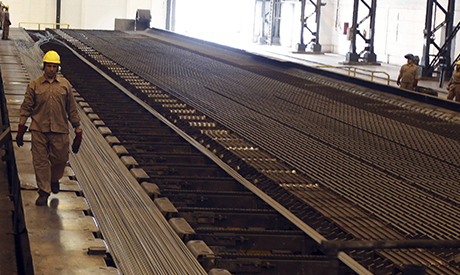
Workers stand on a platform near steel bars at a factory (Photo: Reuters)
Egypt has imposed a temporary 7.3 percent tariff on steel imports, Industry Minister Mounir Fakhry announced.
The move is in response to a petition filed by domestic steel producers in June to warn of rising imports of cheaper steel.
"When we filed the complaint in June, steel imports had reached 390,000 tonnes in the first six months of the year, but the following three months alone saw imports of up to 250,000 tonnes," Mohamed Hanafi, director of the metallurgical industry's chamber of commerce, told Ahram Online.
Since July, locally-produced steel rebar has been offered to consumers for LE5,280 per tonne, compared to LE4,900 per tonne for imported rebars from Turkey and Ukraine.
Import tariffs were set at a minimum of LE290 per tonne for a maximum period of 200 days. Meanwhile, the ministry will be conducting an investigation before making a permanent decision on the issue.
Since the ouster of president Hosni Mubarak in 2011, recurrent violence and political instability have slowed down economic growth.
The steel industry, which depends on state infrastructure projects for 60 percent of demand, according to Hanafi, was hobbled as political turmoil put projects on hold.
However, the industry began to catch up last year, producing 7.3 million tonnes in 2013 – down from a peak of 7.5 million tonnes in 2010, added Hanafi.
A surge in government projects and private sector investment is also expected to increase demand for construction materials.
Earlier this year, the Egyptian army signed a deal with Emirates real estate developer Arabtec to build one million affordable housing units.
Additionally, the government announced plans to undertake several development projects in the north coast city of Alamein, Upper Egypt and along the Suez Canal, following the election of President Abdel-Fattah El-Sisi.
But Hanafi expressed doubts that the expected increase in demand would this year surpass the current production capacity of 10 million tonnes annually.
Short link: